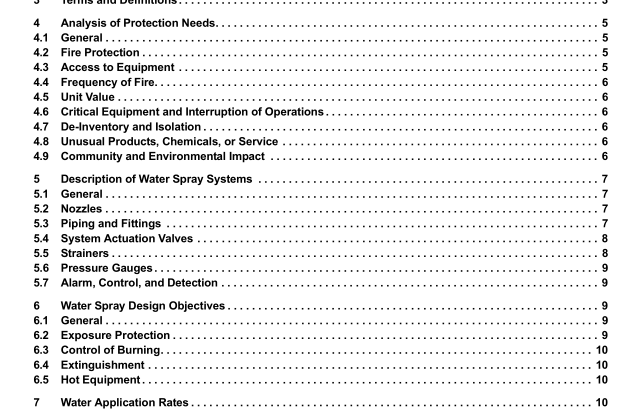API RP 2030:2014 pdf free download.Application of Fixed Water Spray Systems for Fire Protection in the Petroleum and Petrochemical Industries
4.4 Frequency of Fire Experience can indicate that certain types of equipment have higher frequency rates or potential for fire. Typically this might include certain pumps, compressors, and fired heaters. Such fires might expose and damage other nearby equipment and potentially spread the fire. After evaluating other factors (see Section 4.2), designers may choose fixed water systems directed toward the potentially higher rate equipment as a preferred option for limiting the amount of damage and preventing the spread of fire.
4.5 Unit Value Technological growth has made possible construction of larger, more sophisticated and progressively more expensive process units. In some areas these more automated process units require fewer personnel to operate. The use of more sophisticated instrumentation for overseeing operations can result in less on-site field surveillance and fewer people available to respond to fires using manually actuated monitors or hose streams. More expensive facilities have an inherent potential for a higher financial loss if a fire occurs. This potential for greater loss may justify the additional cost of water spray systems to reduce risk and protect company assets.
4.6 Critical Equipment and Interruption of Operations When a water spray system is used for protection of safety- or life-critical equipment, the protection should take into account the hazard to which the equipment may be exposed and the time required for the equipment to complete its function. When equipment which is critical for continued operation is involved in a fire, the loss due to downtime for repairs or replacement can exceed the loss due to physical damage. Such equipment is usually large and has a high value or long replacement time. Provision of water spray systems in addition to passive protection should be considered for critical equipment items. 4.7 De-Inventory and Isolation Emergency shutdown provisions and isolation of process equipment may, to a great extent, determine the type and duration of the fire protection appropriate for a facility. The design and installation of water spray systems in process areas can be based on the potential fire exposure, the expected fire duration and drainage capacity. If process equipment cannot be isolated and de-inventoried or depressured in a timely manner, a fire can have a duration longer than the protection that passive fireproofing can reasonably provide. Application of cooling water from spray systems (or firewater monitors or hand lines) should be given consideration in such cases since this can provide continuing protection for as long as the water supply lasts.
4.8 Unusual Products, Chemicals, or Service In facilities that handle unusual products or chemicals, the physical and chemical compatibility of water with these substances shall be evaluated. Some materials (such as certain metal alkyl catalysts) react violently with water, while fires involving water soluble fuels (such as alcohols and some ethers) are often difficult to extinguish with water. Special consideration should be given to the water compatibility and extinguishment needs for special products and to the appropriate response for materials, which are handled or stored at very high temperature or pressure.
4.9 Community and Environmental Impact In some situations a potential fire location is close to off-site occupancies or environmentally sensitive sites. The possible impact on the community and environment may justify installation and use of water spray systems, where they may not appear needed based on economics or equipment criticality. Alternate scenario analyses should include potential off-site impact of fuel and water run-off.API RP 2030 pdf download.API RP 2030:2014 pdf free download
